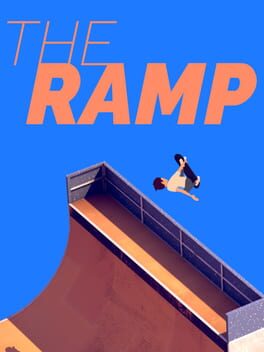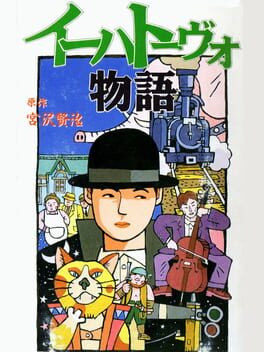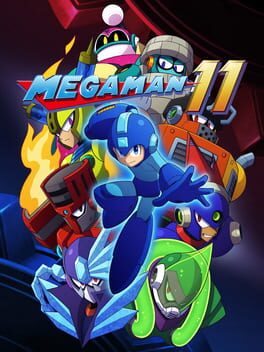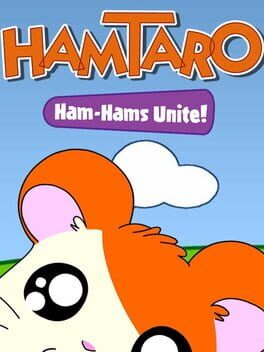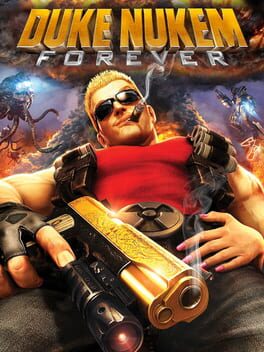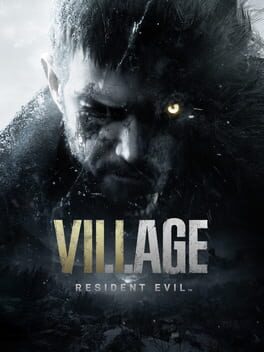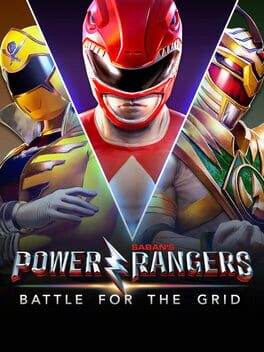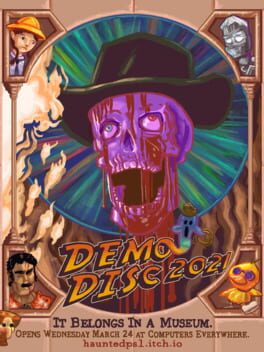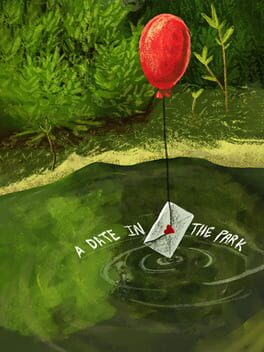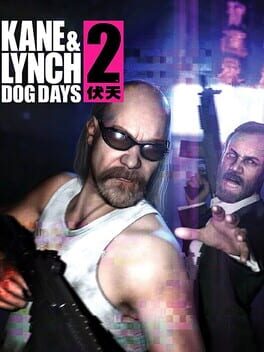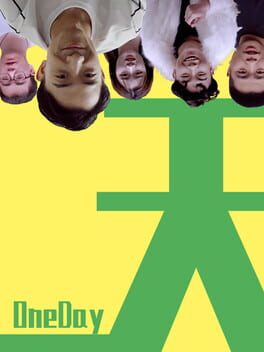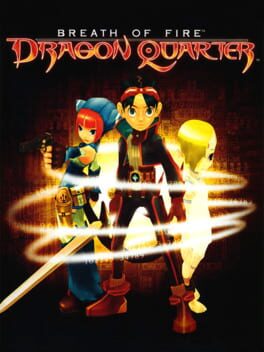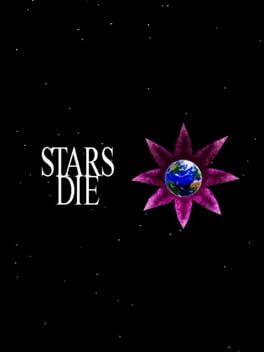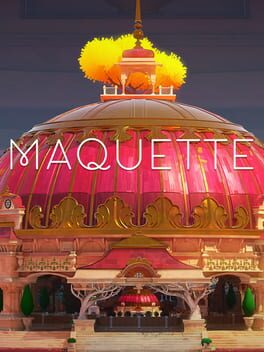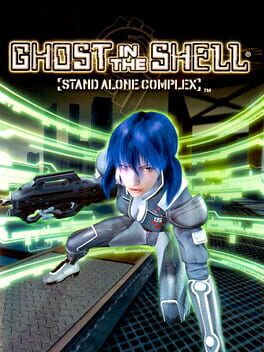2021
not gonna lie, in a way, I am
disappointed because i was expecting an ultra-physical toy, more robust and with less texture, maybe one in the line of Art of Rally, complex and distilled diorama, but is ok, it is honest enough to offer an innocent aesthetic pleasure and understand the art of skateboarding and the joy of the movement itself
disappointed because i was expecting an ultra-physical toy, more robust and with less texture, maybe one in the line of Art of Rally, complex and distilled diorama, but is ok, it is honest enough to offer an innocent aesthetic pleasure and understand the art of skateboarding and the joy of the movement itself
1993
the altruism and warmth of Miyazawa Kenji textured on a few powerful screens. With its slow gaming works, the greatest achievement of Ihatovo Monogatari is not in its formal elements or content, but in knowing how to capture the spirit of a writer and make us travel, for a few hours, to his vision of the world.
2018
From visuals to stiff controls, this game feels like a freshly reactivated zombie.
At one point Mega man was one of the most essential action figures, further popularizing design around skillful play through complementary movements such as the charge shot or the slide, and even if most of the Mega Man series I dislike, these Supplements to the movement revealed that in combination with proficient (not masterful) tiered design action could rise unexpectedly.
Megaman 11 seems to go the other way: level design results in poor comps dependent on low hits to generate challenge (with the exception of the Bounce Man level), the stolen armament of the bosses is uninspired to me, and the supplementary gadgets in the movement, a slowmo and a shot enhancer ... anyway.
Maybe I'm impatient or maybe picky, but after the harsh reception of the infinitely superior Mighty No.9, a game that does have a complementary tool to movement, multitasking and totally integrated into the video game and its action, the rather warm ovation towards Mega Man 11 seems curious to me.
At one point Mega man was one of the most essential action figures, further popularizing design around skillful play through complementary movements such as the charge shot or the slide, and even if most of the Mega Man series I dislike, these Supplements to the movement revealed that in combination with proficient (not masterful) tiered design action could rise unexpectedly.
Megaman 11 seems to go the other way: level design results in poor comps dependent on low hits to generate challenge (with the exception of the Bounce Man level), the stolen armament of the bosses is uninspired to me, and the supplementary gadgets in the movement, a slowmo and a shot enhancer ... anyway.
Maybe I'm impatient or maybe picky, but after the harsh reception of the infinitely superior Mighty No.9, a game that does have a complementary tool to movement, multitasking and totally integrated into the video game and its action, the rather warm ovation towards Mega Man 11 seems curious to me.
The messenger, the oldest and most widespread role in video games.
Communication condensed in a small, fleeting and adorable society like the hamsters themselves
Director Mariko Yumoto hints at delicacy by treating and demanding understanding from NPCs in a manner similar to Love-the-lic games in an approach more focused on small interaction commands than time and space.
Even so, the game is very small and calls for expansion in concept, but the small achievement of being able to encapsulate slang communication with delicacy and rhythm in a game that (probably) was aimed at children is admirable.
Communication condensed in a small, fleeting and adorable society like the hamsters themselves
Director Mariko Yumoto hints at delicacy by treating and demanding understanding from NPCs in a manner similar to Love-the-lic games in an approach more focused on small interaction commands than time and space.
Even so, the game is very small and calls for expansion in concept, but the small achievement of being able to encapsulate slang communication with delicacy and rhythm in a game that (probably) was aimed at children is admirable.
2011
It's funny that a disgraced 90s rockstar fart has something to reveal about FPS.
We have gone from understanding the space designed for the challenge of navigation and combat to offering it as a scripted process between arenas with action at 2 heights (maybe 3-4)
One of the things I remember about Duke Nukem 3d was the arsenal and the architectural makeup contributed to a slightly more irreverent (and farting) aesthetic that differentiated it from any Doom clone, ironic that forever feels like a frankenstein from the 2000 shooter without nothing that differentiates it beyond his big mouth
We have gone from understanding the space designed for the challenge of navigation and combat to offering it as a scripted process between arenas with action at 2 heights (maybe 3-4)
One of the things I remember about Duke Nukem 3d was the arsenal and the architectural makeup contributed to a slightly more irreverent (and farting) aesthetic that differentiated it from any Doom clone, ironic that forever feels like a frankenstein from the 2000 shooter without nothing that differentiates it beyond his big mouth
This is the stupidest RE installment yet, the Ethan Winters saga is the most homogenically western and cliche-ridden American horror duology literature I've played in years.
VILLAGE writer Anthony Johnston gets lost in his snobbish American lens delivering a portrait of a lost rural village where the most uninspired monsters clumsily assault us. Licantropes riding horses, Vampires, zombies with swords? A guy with magneto abilities that transforms himself into ... A transformer ??? What the Fuck (well at least this one is more creative, even if it causes embarrassment)
Although inspired by RE4, the cliches also devour the approach to action and navigation, with a standard array of weapons and a first-person perspective, the combat does not differ one bit from the rest of survival FPS of the last decade, feeling The regression of the multiple and superior combat options in RE4, and the semi-open level design does not turn out to be as threatening or challenging to navigate as the corridors of RE2 2019, or Union, the city of The Evil Within 2, seems the Little inspiration of VILLAGE turns to the voyeurism of playing hide and seek with Lady Dimitrescu and her daughters (visual delight for otakus) and the grotesque images of Ethan being injured and maimed,.a waste of energy from my point of view. Not a theme park, not a true gender collage.
It is curious that this game makes me appreciate The evil within 2 more since in essence they are the same, a Japanese collage of universal horror with strong American influences, but while VILLAGE takes it in a bland and voyeuristic way, the evil within 2 is more elegant and creative with its context and spatial flow. Oh! and the setting in rural lost towns has to end, the anonymous rural Spain frozen in time with pesetas included from R4 was fun, but .
BTW, if you are going to comment on something like "American through a non-American lens", please save it, the point is not the lens, it is the cliche and voyeurism to which cities and villages are reduced under that vision
VILLAGE writer Anthony Johnston gets lost in his snobbish American lens delivering a portrait of a lost rural village where the most uninspired monsters clumsily assault us. Licantropes riding horses, Vampires, zombies with swords? A guy with magneto abilities that transforms himself into ... A transformer ??? What the Fuck (well at least this one is more creative, even if it causes embarrassment)
Although inspired by RE4, the cliches also devour the approach to action and navigation, with a standard array of weapons and a first-person perspective, the combat does not differ one bit from the rest of survival FPS of the last decade, feeling The regression of the multiple and superior combat options in RE4, and the semi-open level design does not turn out to be as threatening or challenging to navigate as the corridors of RE2 2019, or Union, the city of The Evil Within 2, seems the Little inspiration of VILLAGE turns to the voyeurism of playing hide and seek with Lady Dimitrescu and her daughters (visual delight for otakus) and the grotesque images of Ethan being injured and maimed,.a waste of energy from my point of view. Not a theme park, not a true gender collage.
It is curious that this game makes me appreciate The evil within 2 more since in essence they are the same, a Japanese collage of universal horror with strong American influences, but while VILLAGE takes it in a bland and voyeuristic way, the evil within 2 is more elegant and creative with its context and spatial flow. Oh! and the setting in rural lost towns has to end, the anonymous rural Spain frozen in time with pesetas included from R4 was fun, but .
BTW, if you are going to comment on something like "American through a non-American lens", please save it, the point is not the lens, it is the cliche and voyeurism to which cities and villages are reduced under that vision
maybe I'm in total paranoia but lately I only see aesthetic experiences of the psOne like, dunno, excuses to offer not too inspired shots of what that era was supposed to be. It makes me curious that attempts are made to emulate tank controls, difficult cameras and environments totally focused on spooky vibes when the fifth generation of consoles and in general the transition between the 20th to the 21st century is a time of almost forced experimentation, especially the PsOne or the NET YAROZE. curiously, one of the most successful aesthetic experiences that I have had with this wave has been with the Hub world of this "demo disk" lol, a museum that looks and with which it interacts like a first-person game of the psone but totally aware of its anthology or so It seems, which I appreciate since these games are not as rigid or disturbing or limited as they are remembered.
I know anyway if there are a handful of interesting concepts, from;
a cute (which I think is a cover for some horror metagame) flow-dependent platformer its straight inertia to the Nimpen Manmaru, an ultra-vertical meditative first-person climbing game about the space to occupy, or the most interesting for me, a fake Documentary video game about the fall of an MMO, its last hours of life, the people who inhabit it and inhabited it and ... about the impact of the video game in real life? I don't know, but it's super adolescent , romantic and kinda mumblecore. my favorite of the whole lot.
I love these builds, only most games are not my thing.
I know anyway if there are a handful of interesting concepts, from;
a cute (which I think is a cover for some horror metagame) flow-dependent platformer its straight inertia to the Nimpen Manmaru, an ultra-vertical meditative first-person climbing game about the space to occupy, or the most interesting for me, a fake Documentary video game about the fall of an MMO, its last hours of life, the people who inhabit it and inhabited it and ... about the impact of the video game in real life? I don't know, but it's super adolescent , romantic and kinda mumblecore. my favorite of the whole lot.
I love these builds, only most games are not my thing.
2014
at the time of Army Of Two, 50 Cent blood in the sand, Stranglehold, Homefront, Uncharted or even the first Kane & Lynch, commercial video games seemed to point to a mindless mass future in which firearms and killings in suburvial environments no longer than 6 hours , with a compulsory multiplayer it sounded like money and almost all of them celebrated themselves unaware of their imperialist premises.
I have always had a fascination for suburban spaces as a setting for drama or action, but I am a bit pissed off by the approaches that see them as a simple playground for violence or misery pornography, which is exactly how it is usually seen under American lenses.
so why not crash the van into the avenue of American shooter and, for once, honestly present what happens here? no context no motivation no satisfaction, just a graphic document in Shanghai, a city often seen by Westerners as a playground for pleasure or shady business, with a conscious camera alerted to cinematic intentions and aesthetically unsightly, ireespectful with the eyes and the hands of the player but, curiously, more visually respectable with the deaths, censoring genitals and disfigurements (taking notes Naughty Dog?) and I don't know what the hell is wrong with the sound.
maybe because the IO interactive anthology doesn't know many more verbs than "kill", you know, the hitman saga, freedom fighters (lol) and they know it, they wanted to take a chance with an exercise on the shame of some "antiheroes" in a "field of games"
Also, play Reciever, it is good and also faithfully presents the use of a firearm
I have always had a fascination for suburban spaces as a setting for drama or action, but I am a bit pissed off by the approaches that see them as a simple playground for violence or misery pornography, which is exactly how it is usually seen under American lenses.
so why not crash the van into the avenue of American shooter and, for once, honestly present what happens here? no context no motivation no satisfaction, just a graphic document in Shanghai, a city often seen by Westerners as a playground for pleasure or shady business, with a conscious camera alerted to cinematic intentions and aesthetically unsightly, ireespectful with the eyes and the hands of the player but, curiously, more visually respectable with the deaths, censoring genitals and disfigurements (taking notes Naughty Dog?) and I don't know what the hell is wrong with the sound.
maybe because the IO interactive anthology doesn't know many more verbs than "kill", you know, the hitman saga, freedom fighters (lol) and they know it, they wanted to take a chance with an exercise on the shame of some "antiheroes" in a "field of games"
Also, play Reciever, it is good and also faithfully presents the use of a firearm
2019
Half of the review is obvious thoughts on the genre of the jrpgs to give some context
"This is a tiny tale of time"
A colorful punk brushstroke in the genre "JRPG". DRAGON QUARTER (DQ) was born as a response to its own saga and its own anthology, sticking to its more classic elements but readjusting the more established elements that seem to be stylistic features of a genre. that, at the end of the day, they are just comforts;
World.
Time.
Combat.
Movement.
economy.
Drama.
Difficulty.
Trips.
Although I have always had a lot of affection for the cities of Japanese RPGs, the worlds they build seem to me like a lie, not diegetically, but as a sensation entirely. Normally these "worlds" due to their abstract nature born from 2D pixels are flat fields painted with deserts, plains, gorges, whatever you want, but their scale and ability to navigate never changes or affects, perhaps by convention, perhaps because RPGs are already too numerical and schematized to add more nuances to a navigation that, although it has aesthetic detail, is a process between combats and drama, which are also insufficient to transmit something cohesive, since the combats are usually linked to the context of the drama. In JRPGS, the characters are usually forced to travel the world as they become a kind of misunderstood fugitives for whatever reasons, they are in constant tension, sometimes pursued or in a race against time and they are supposed to be travelers, with resources and cargo. limited. curiously, the player can take all the time in the world, can go wherever he wants (with relative freedom), the combat is relaxed with enough resources and time does not advance, there is also nothing that translates or symbolizes some kind of mental or spiritual fatigue, if there are mana tonics and potions and such but that shouldn't cure stress or fear. And one thing, the protagonists, usually kids with great hearts, eager or not for adventure and wanting to discover the world, ambitious but without a clear vision of how the world works and how they want to be part of it ... Or depressed boys because Their giant and extremely cool sword weighs too much or the spikes of their hairstyles are not very perfect, whatever.
All of this will sound like obvious points, but exemplifications of some problems that lead to dissonant experiences for me, which should be an exciting and emotional adventure through a magitechnological world in which danger and joy come together and innocence gives way to Maturity ends up being a smooth and comfortable walk through a flat field where everything is static and the drama tries to deceive me, and all because JRPGs are supposed to be like that, that's the way the genre is.
Dragon Quarter (DQ) seems to be aware of this dissonant base and chooses to eliminate the "JRPG world" and its approach as it is popularly known, but sticking to some of the rules of the game.
it begins by eliminating the world, it does not exist. There are no green meadows or blue skies as far as the eye can see with a city looming around the corner, because there is not even a sky in the world that DQuarter takes place. people are forced to live in an underground world as deep as it is depressing, there are hardly any resources or space, the air is almost a precious commodity and only a dictated community order is what seems to work. It is not a world, but a succession of interconected corridors neither freedom nor space, there are no real cities or safe havens at all. In the middle of this dystopia is the protagonist, a young cop named Ryu (like all the protagonists of the BoF saga https://bof.fandom.com/wiki/Ryu) disappointed with life and living in the shadow of his friend ( cliche). During a mission he discovers that the government is experimenting with a girl (https://bof.fandom.com/wiki/Nina), he decides to rescue her and flee with her, acquiring the power to transform into a human-dragon hybrid that it becomes almost invincible, but with a high price to pay for abusing it.
With this starting point DQuarter establishes a drama accompanied by its mechanics and its formalities.
We are fleeing from a government and its army with powerful generals (bosses) crossing a world full of monsters, so taking distance between the pursuers and the obstacles seems to be the most sensible thing, the director Makoto Ikehara and his team opts to raise the difficulty and design a combat around space and the management of movement and resources, but without a board or squares, all on a proportional scale and moving away from pseudonaturalist spaces where to position correctly and wisely use the skills to efficiently attack groups of enemies and exploit improvised strategies to generate distance with us and between them is the key to survival, (combat has more complexities, but it is worth discovering them for yourself). But the most important element and that symbolizes both the urgency of time, and the deterioration of the group (those things that JRPGs tend to ignore) It's the D-Counter mechanic, which regulates the player's usage of the dragon transformation ability, penalizing and eventually punishing overuse of dragon related abilities. If the D-Counter reaches 100% before a certain event in the game, the player will receive a game over, so they can go back to the last save point or start the game again keeping all the equipment and experience, however When starting the trip again, new scenes and dialogues will appear revealing little by little, and with each defeat the truth about everything that is happening and suggesting more consistently the value of accepting defeat as opposed to those JRPGs with blue skies that seem to want to avoid let the player experience it.
DQuarter replaces joy and color for oppression and lack of natural sunlight, it is a game that replaces the simplicity of the classic turn-based combat system with a complex balance of movement, combo strings of attacks with various properties and is not afraid of being difficult or brutal, or remind you that death constantly stalks you through a HUD number. is not afraid to deliver a Cheat Code in the form of mechanics or risky narrative approaches.
It's a gutsy game in a very stagnant genre and an imperfect (lol) masterpiece, and its end, could not be anything other than a sight of a blue sky.
"This is a tiny tale of time"
A colorful punk brushstroke in the genre "JRPG". DRAGON QUARTER (DQ) was born as a response to its own saga and its own anthology, sticking to its more classic elements but readjusting the more established elements that seem to be stylistic features of a genre. that, at the end of the day, they are just comforts;
World.
Time.
Combat.
Movement.
economy.
Drama.
Difficulty.
Trips.
Although I have always had a lot of affection for the cities of Japanese RPGs, the worlds they build seem to me like a lie, not diegetically, but as a sensation entirely. Normally these "worlds" due to their abstract nature born from 2D pixels are flat fields painted with deserts, plains, gorges, whatever you want, but their scale and ability to navigate never changes or affects, perhaps by convention, perhaps because RPGs are already too numerical and schematized to add more nuances to a navigation that, although it has aesthetic detail, is a process between combats and drama, which are also insufficient to transmit something cohesive, since the combats are usually linked to the context of the drama. In JRPGS, the characters are usually forced to travel the world as they become a kind of misunderstood fugitives for whatever reasons, they are in constant tension, sometimes pursued or in a race against time and they are supposed to be travelers, with resources and cargo. limited. curiously, the player can take all the time in the world, can go wherever he wants (with relative freedom), the combat is relaxed with enough resources and time does not advance, there is also nothing that translates or symbolizes some kind of mental or spiritual fatigue, if there are mana tonics and potions and such but that shouldn't cure stress or fear. And one thing, the protagonists, usually kids with great hearts, eager or not for adventure and wanting to discover the world, ambitious but without a clear vision of how the world works and how they want to be part of it ... Or depressed boys because Their giant and extremely cool sword weighs too much or the spikes of their hairstyles are not very perfect, whatever.
All of this will sound like obvious points, but exemplifications of some problems that lead to dissonant experiences for me, which should be an exciting and emotional adventure through a magitechnological world in which danger and joy come together and innocence gives way to Maturity ends up being a smooth and comfortable walk through a flat field where everything is static and the drama tries to deceive me, and all because JRPGs are supposed to be like that, that's the way the genre is.
Dragon Quarter (DQ) seems to be aware of this dissonant base and chooses to eliminate the "JRPG world" and its approach as it is popularly known, but sticking to some of the rules of the game.
it begins by eliminating the world, it does not exist. There are no green meadows or blue skies as far as the eye can see with a city looming around the corner, because there is not even a sky in the world that DQuarter takes place. people are forced to live in an underground world as deep as it is depressing, there are hardly any resources or space, the air is almost a precious commodity and only a dictated community order is what seems to work. It is not a world, but a succession of interconected corridors neither freedom nor space, there are no real cities or safe havens at all. In the middle of this dystopia is the protagonist, a young cop named Ryu (like all the protagonists of the BoF saga https://bof.fandom.com/wiki/Ryu) disappointed with life and living in the shadow of his friend ( cliche). During a mission he discovers that the government is experimenting with a girl (https://bof.fandom.com/wiki/Nina), he decides to rescue her and flee with her, acquiring the power to transform into a human-dragon hybrid that it becomes almost invincible, but with a high price to pay for abusing it.
With this starting point DQuarter establishes a drama accompanied by its mechanics and its formalities.
We are fleeing from a government and its army with powerful generals (bosses) crossing a world full of monsters, so taking distance between the pursuers and the obstacles seems to be the most sensible thing, the director Makoto Ikehara and his team opts to raise the difficulty and design a combat around space and the management of movement and resources, but without a board or squares, all on a proportional scale and moving away from pseudonaturalist spaces where to position correctly and wisely use the skills to efficiently attack groups of enemies and exploit improvised strategies to generate distance with us and between them is the key to survival, (combat has more complexities, but it is worth discovering them for yourself). But the most important element and that symbolizes both the urgency of time, and the deterioration of the group (those things that JRPGs tend to ignore) It's the D-Counter mechanic, which regulates the player's usage of the dragon transformation ability, penalizing and eventually punishing overuse of dragon related abilities. If the D-Counter reaches 100% before a certain event in the game, the player will receive a game over, so they can go back to the last save point or start the game again keeping all the equipment and experience, however When starting the trip again, new scenes and dialogues will appear revealing little by little, and with each defeat the truth about everything that is happening and suggesting more consistently the value of accepting defeat as opposed to those JRPGs with blue skies that seem to want to avoid let the player experience it.
DQuarter replaces joy and color for oppression and lack of natural sunlight, it is a game that replaces the simplicity of the classic turn-based combat system with a complex balance of movement, combo strings of attacks with various properties and is not afraid of being difficult or brutal, or remind you that death constantly stalks you through a HUD number. is not afraid to deliver a Cheat Code in the form of mechanics or risky narrative approaches.
It's a gutsy game in a very stagnant genre and an imperfect (lol) masterpiece, and its end, could not be anything other than a sight of a blue sky.
2020
i´m a little boring here to see the same ways to use the PsOne aesthetic. one can argue that is perfect to deliver a great mysterious atmosphere, but sometimes seems like THE ONLY way the authors use it despite the fact that the era from which this aesthetic was born is one of the most varied and experimental.
It makes me sad that the game did not catch me, and I think it is due to the exploratory dialogue system, maybe it is my fault but when they let me play a character with a more or less perceptible background and the game gives me freedom to interpret it, I do not usually enter the game, because it's not me, obviously, but I never know exactly what I want to be with a character that I have to explore through dialogue. or maybe i miss the point entirely, idk
I want to go shopping with Greta Gerwig
It makes me sad that the game did not catch me, and I think it is due to the exploratory dialogue system, maybe it is my fault but when they let me play a character with a more or less perceptible background and the game gives me freedom to interpret it, I do not usually enter the game, because it's not me, obviously, but I never know exactly what I want to be with a character that I have to explore through dialogue. or maybe i miss the point entirely, idk
I want to go shopping with Greta Gerwig
2021
surely this game was conceived as an FPS while Cavia probably had to break their balls trying to justify the Ghost in the shell license by jumping and hand-to-hand combat, Or maybe it was entirely the opposite judging also by how little "designed for the player" that the levels feel, the thing is that it works like a basic first person shooter set in third vision with vertical complexity and using well the emptiness of its almost naturalistic spaces. It is a game about empty spaces. Also, why are there so many "worst ps2 games" lists with this game? people need to stop looking for content-packed games.
video games usually do 3 or 4 things, hopefully, of what they set out to do
video games usually do 3 or 4 things, hopefully, of what they set out to do
